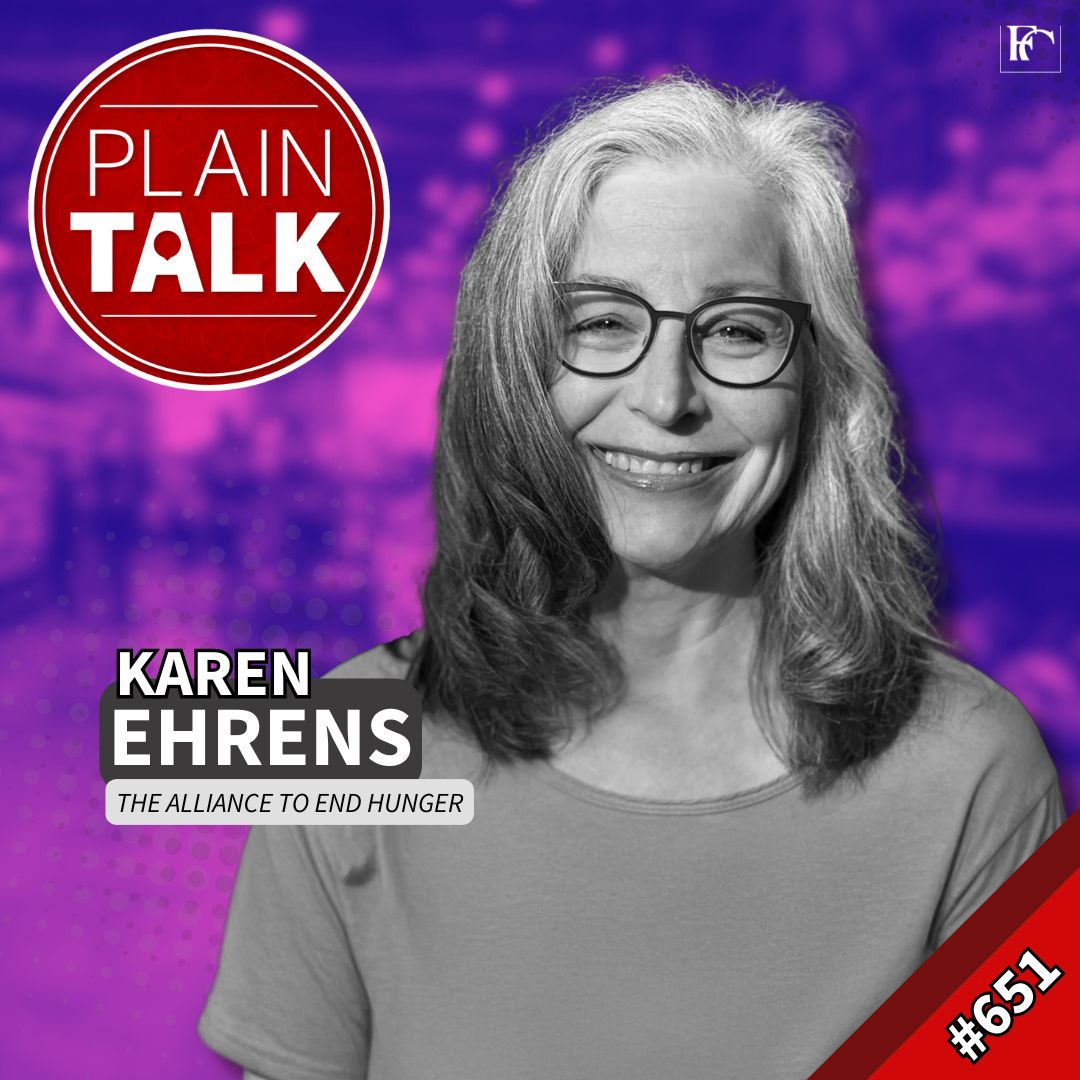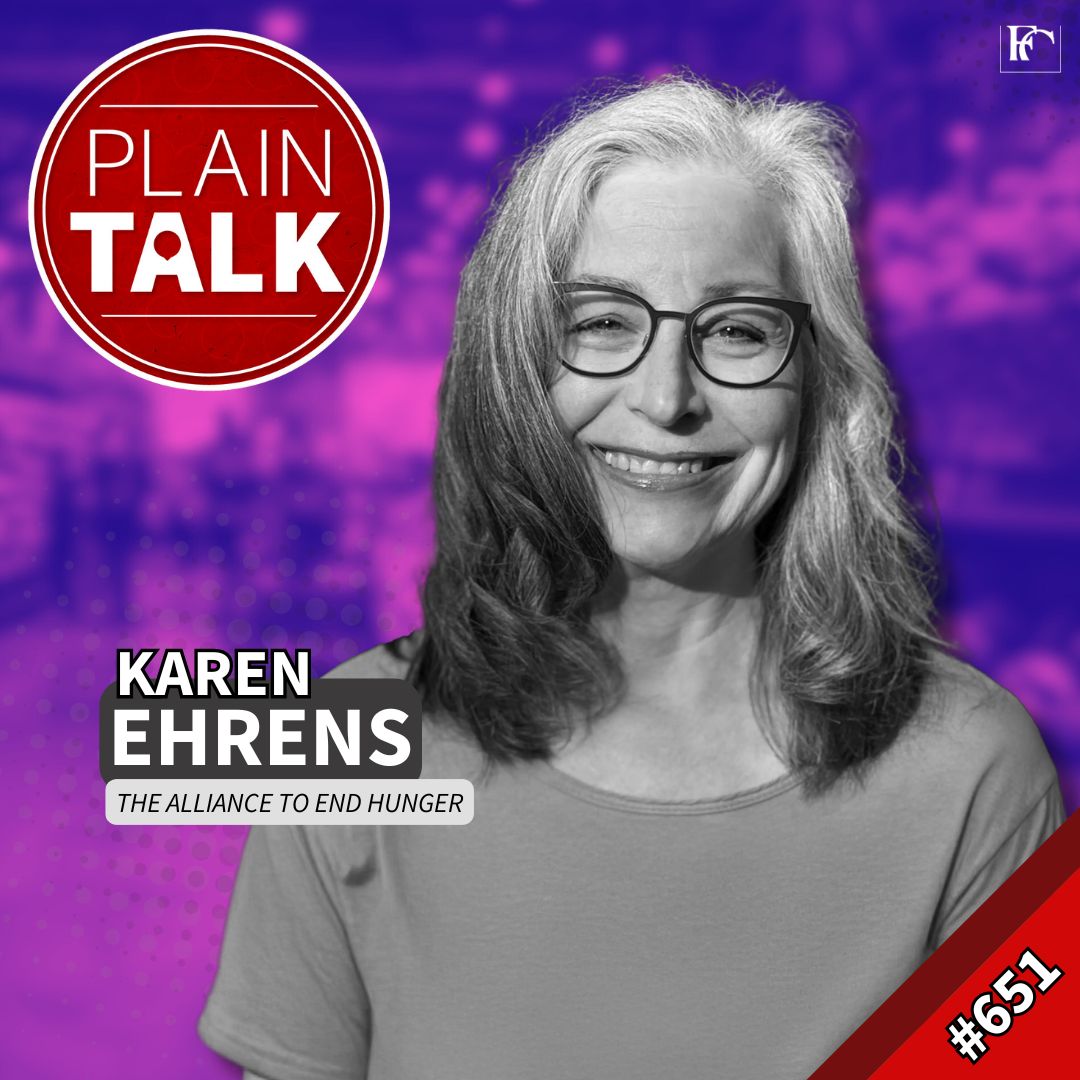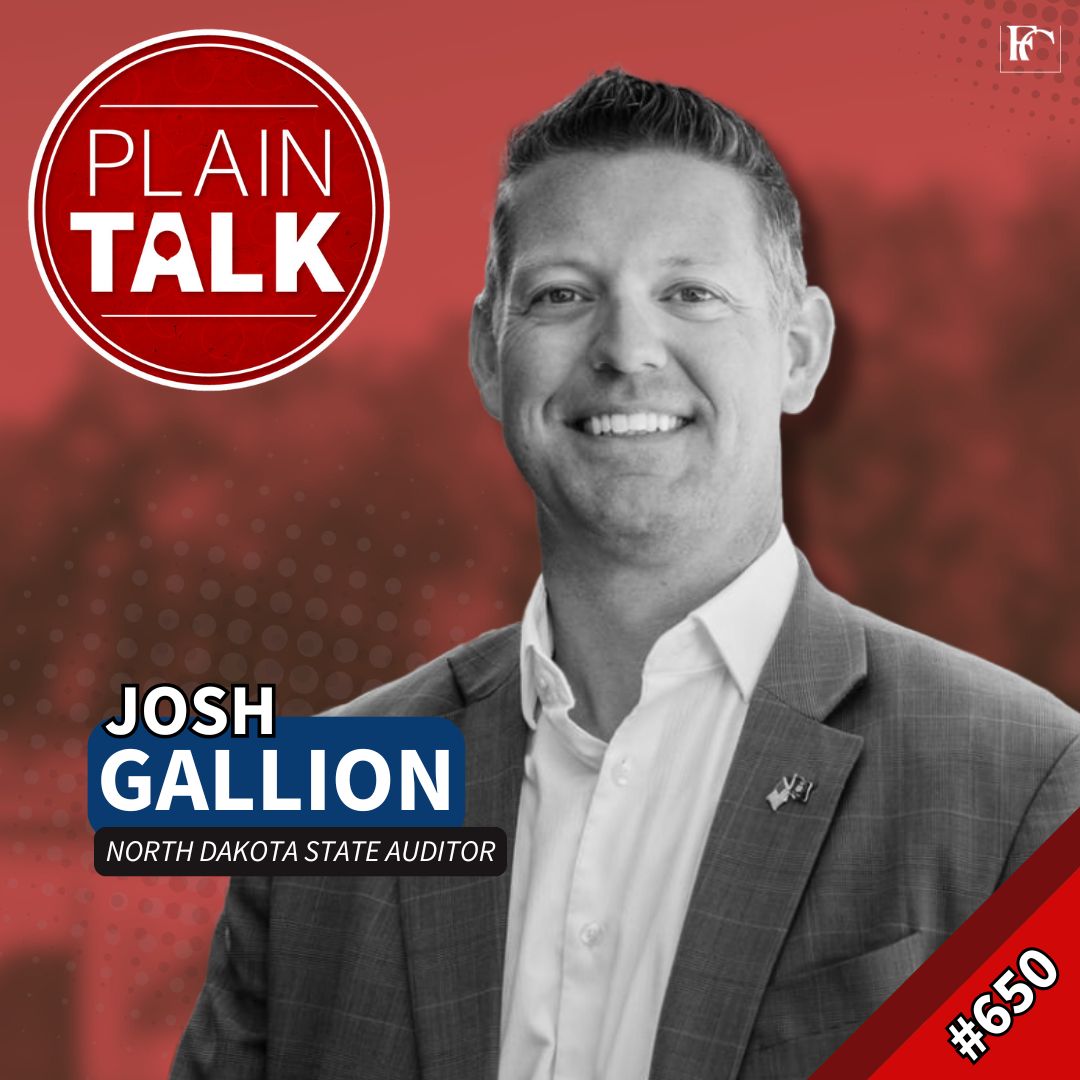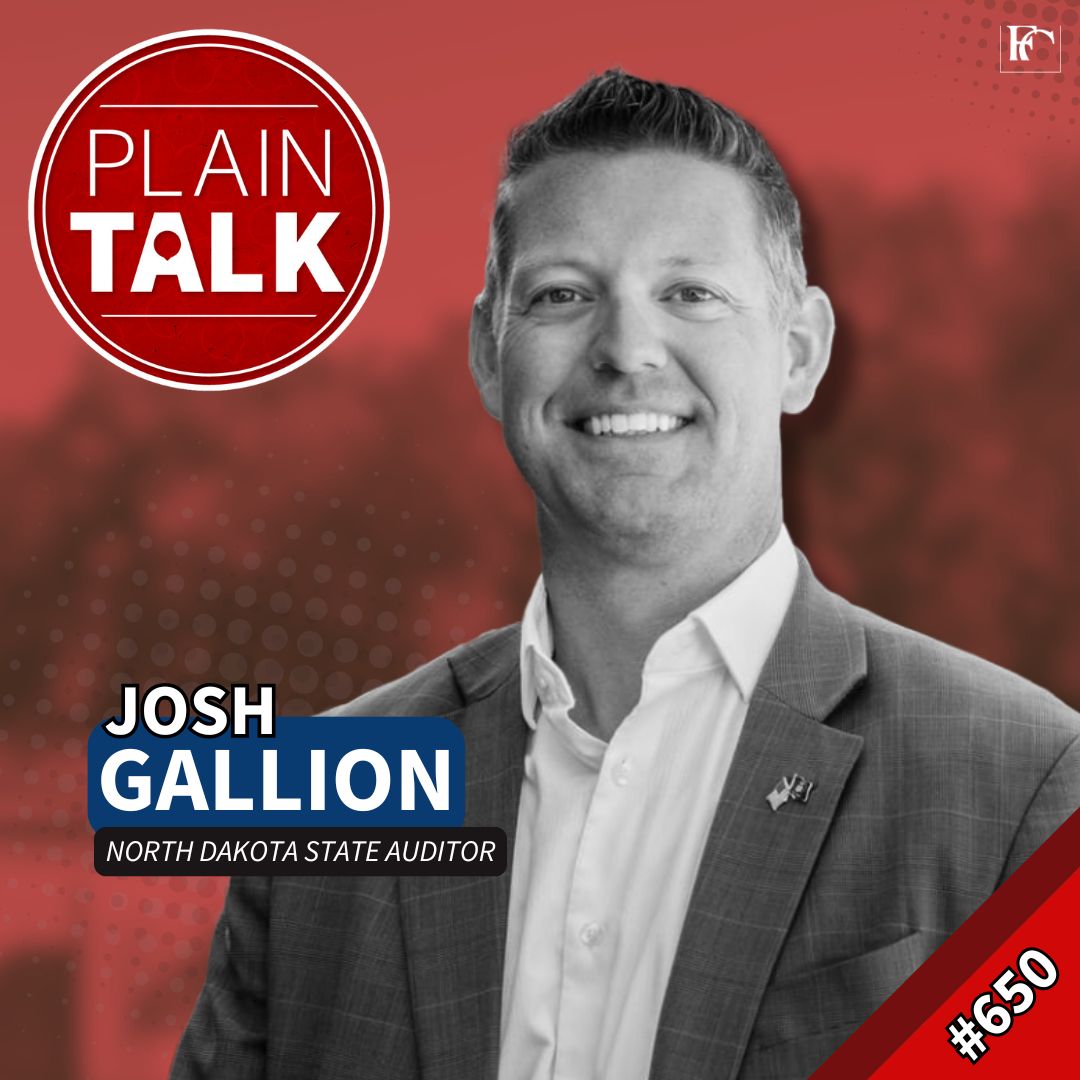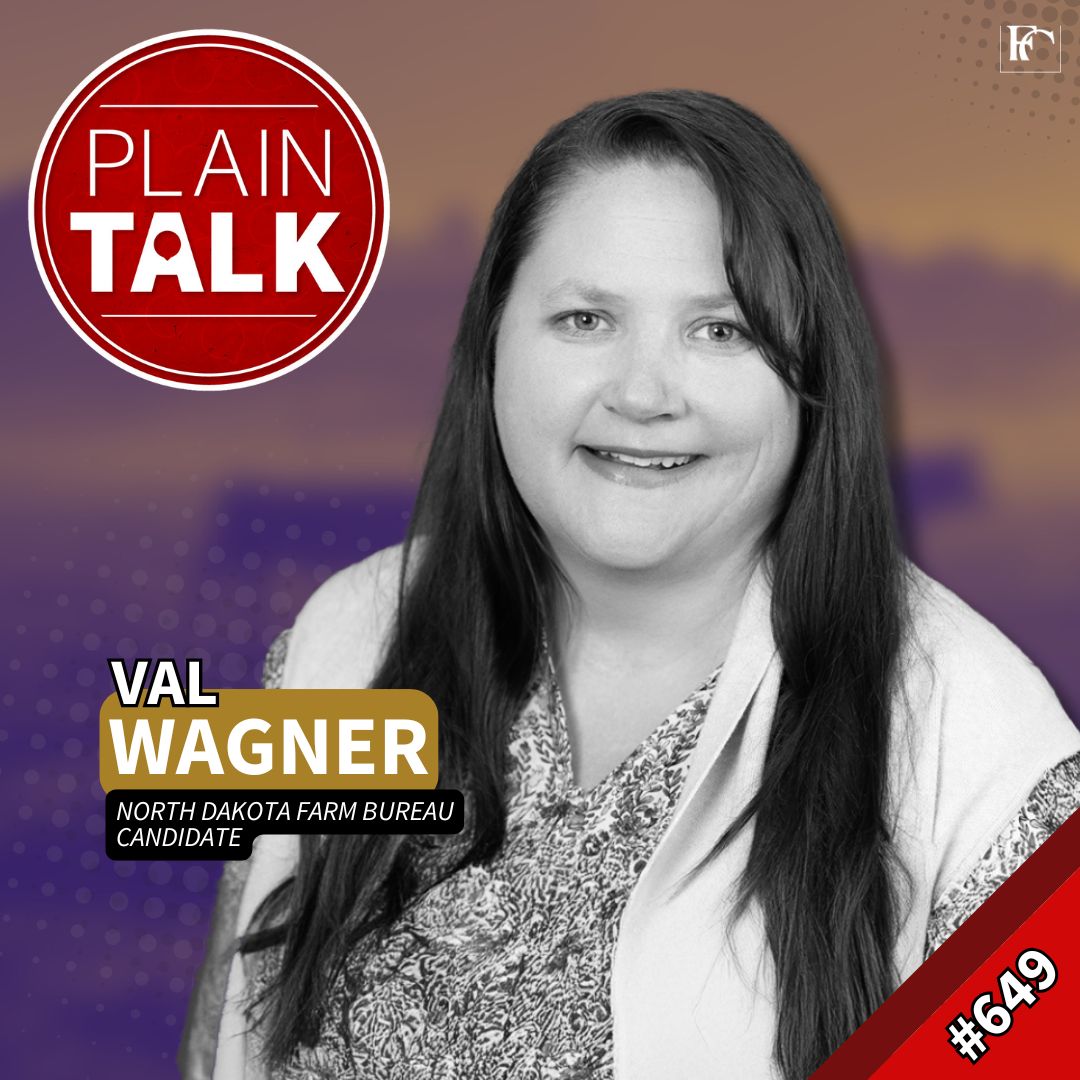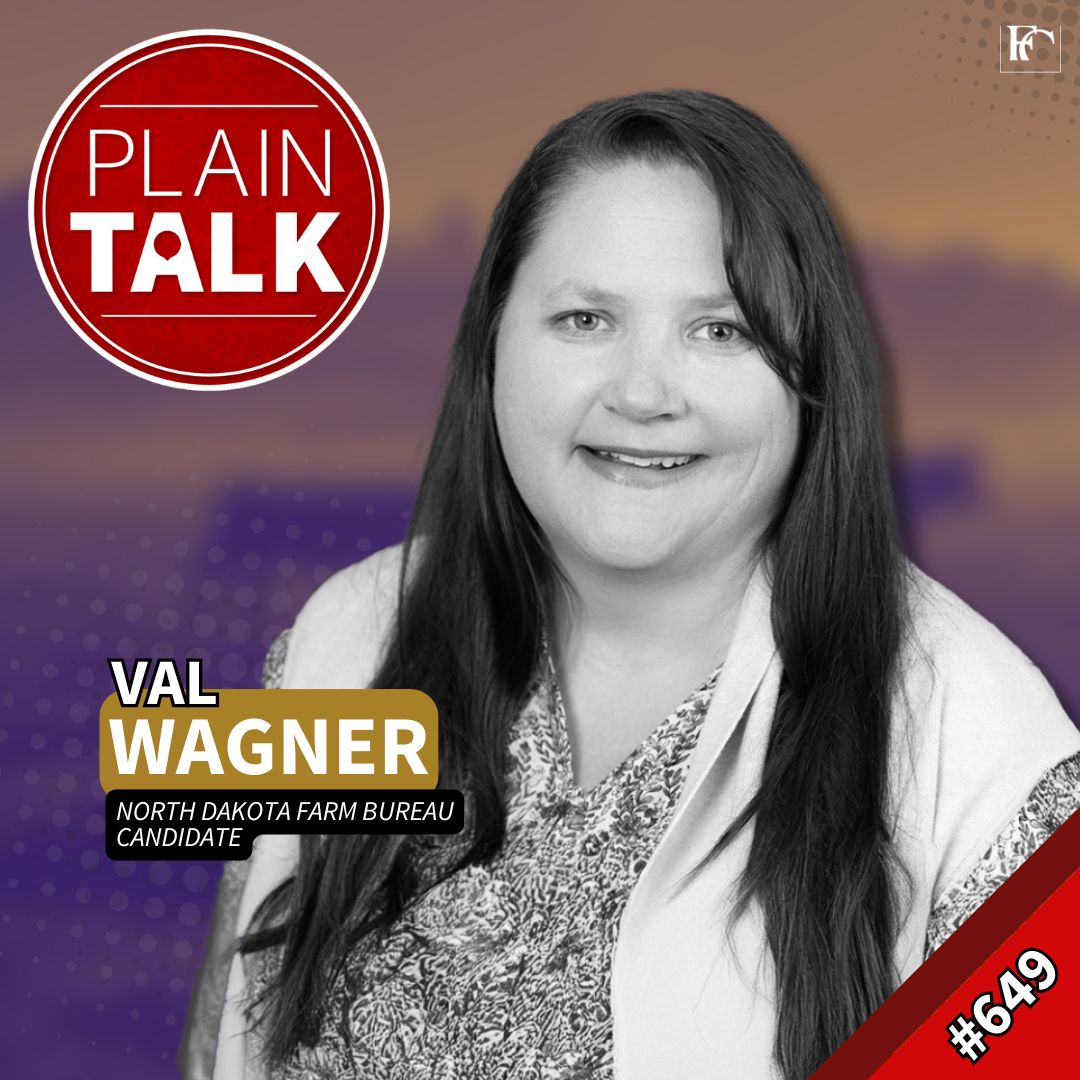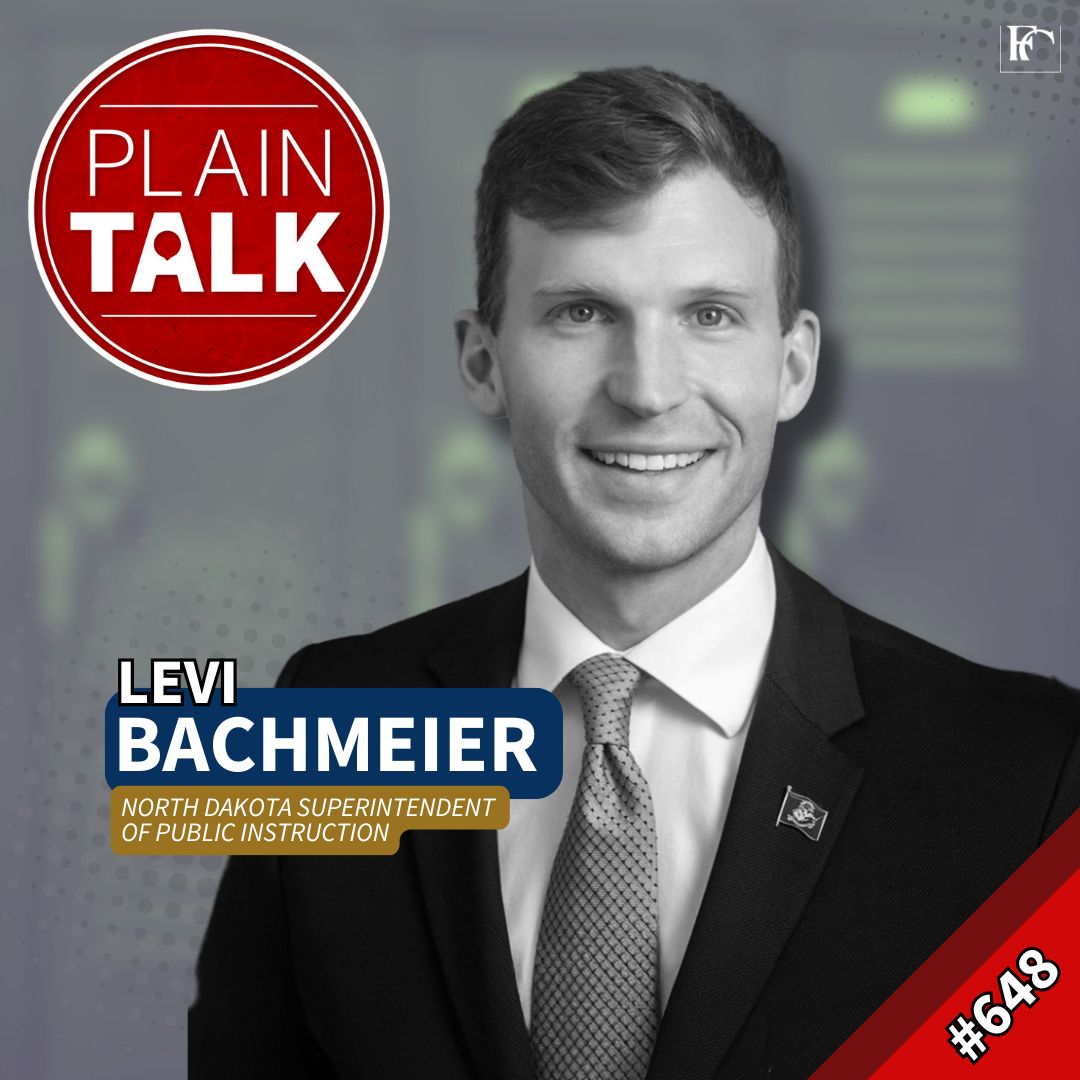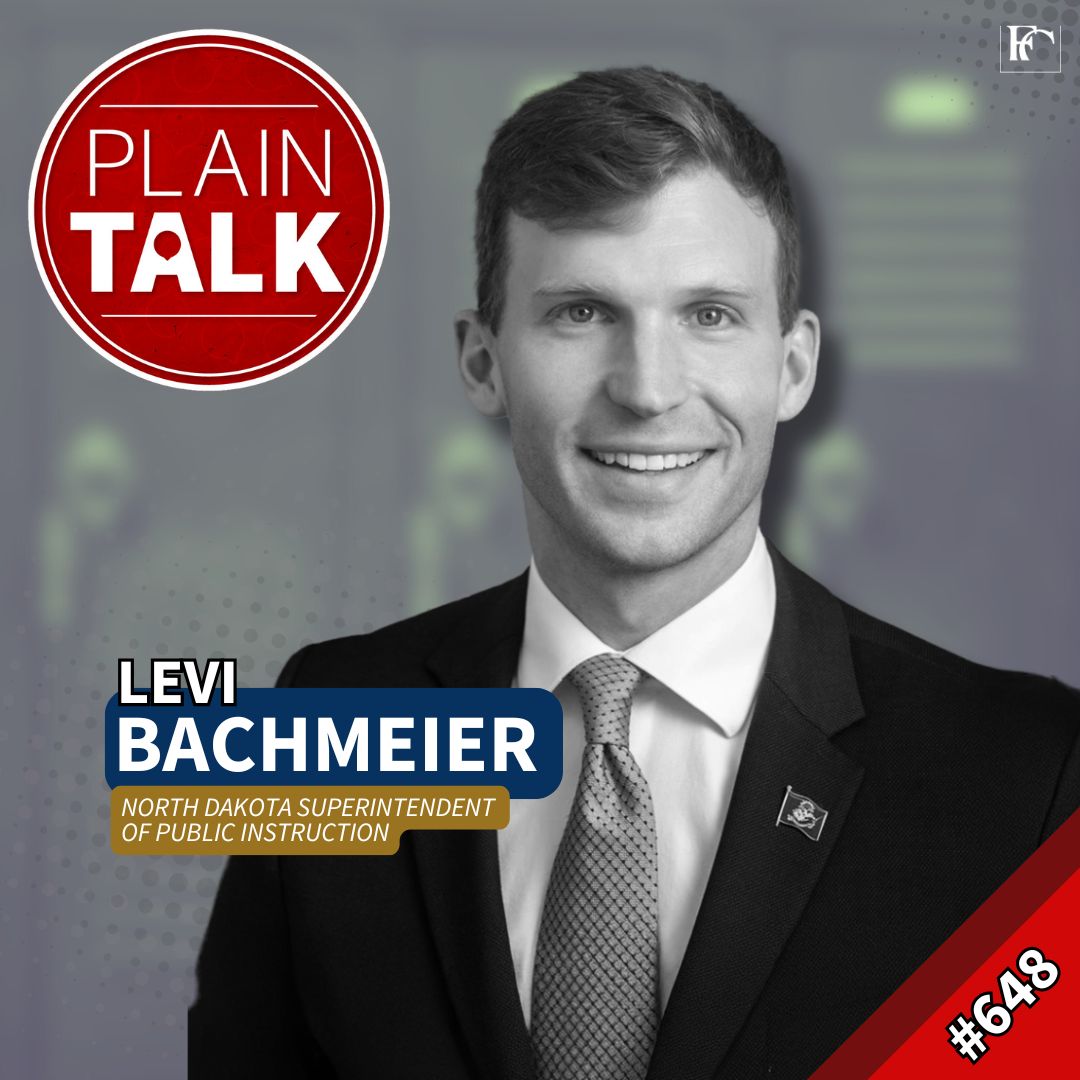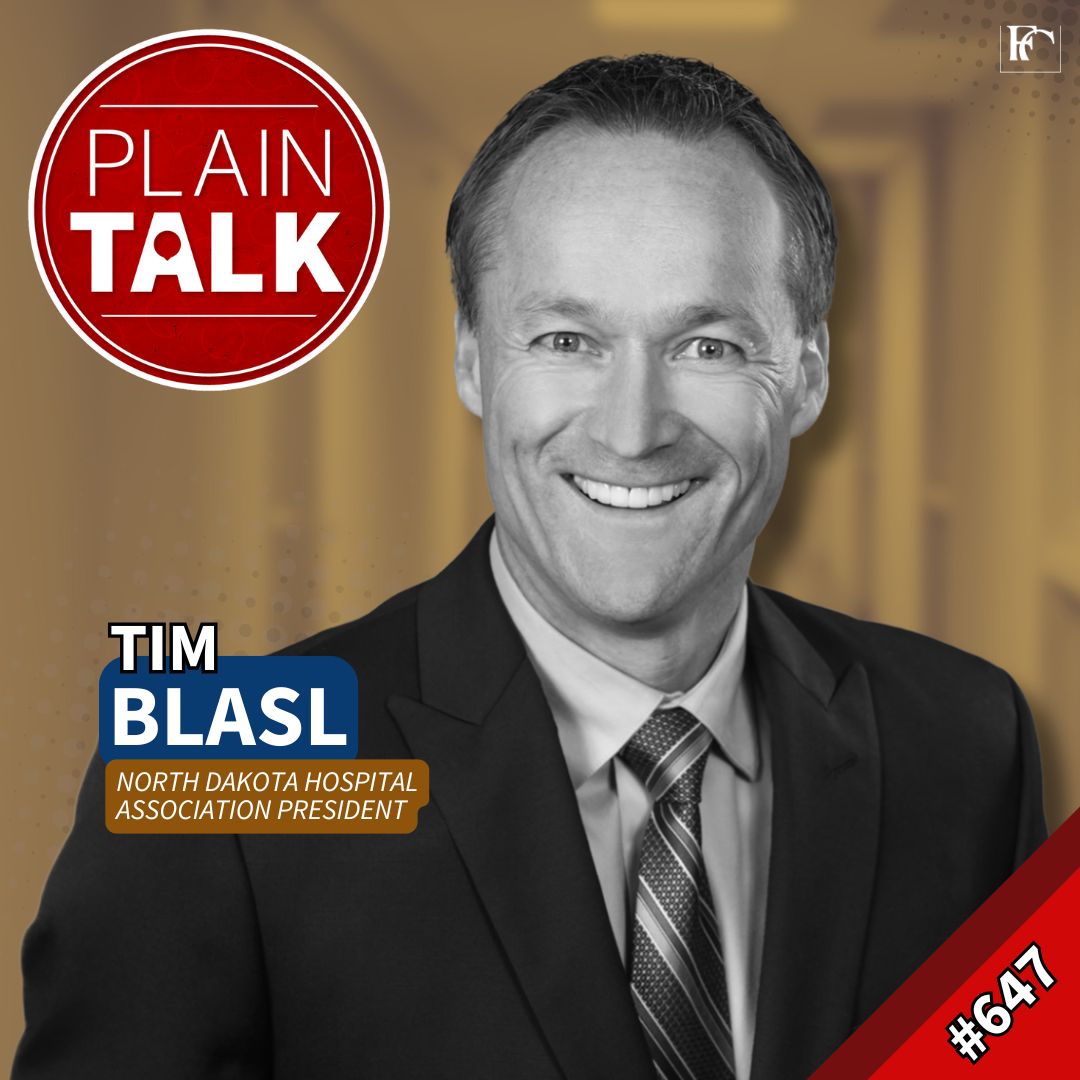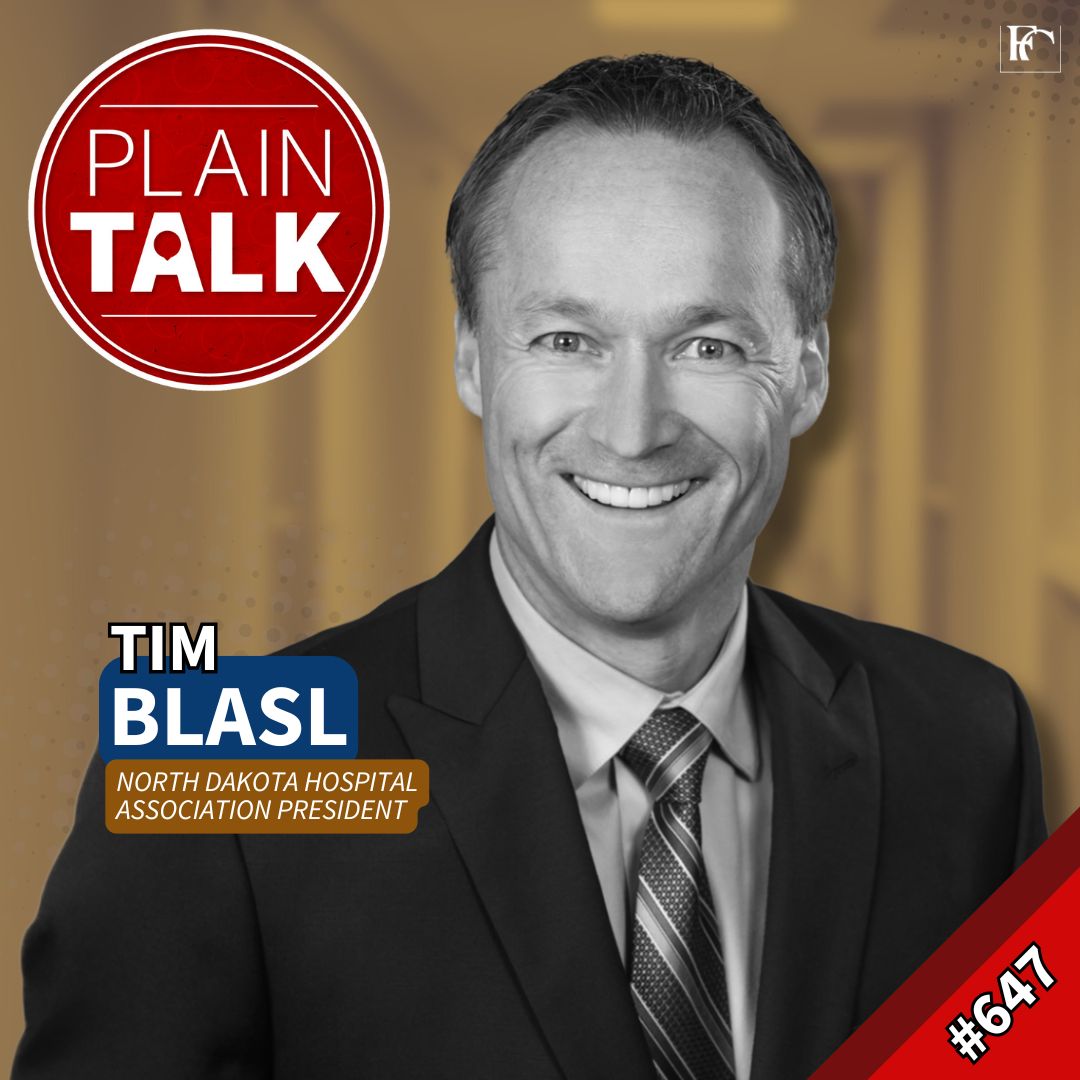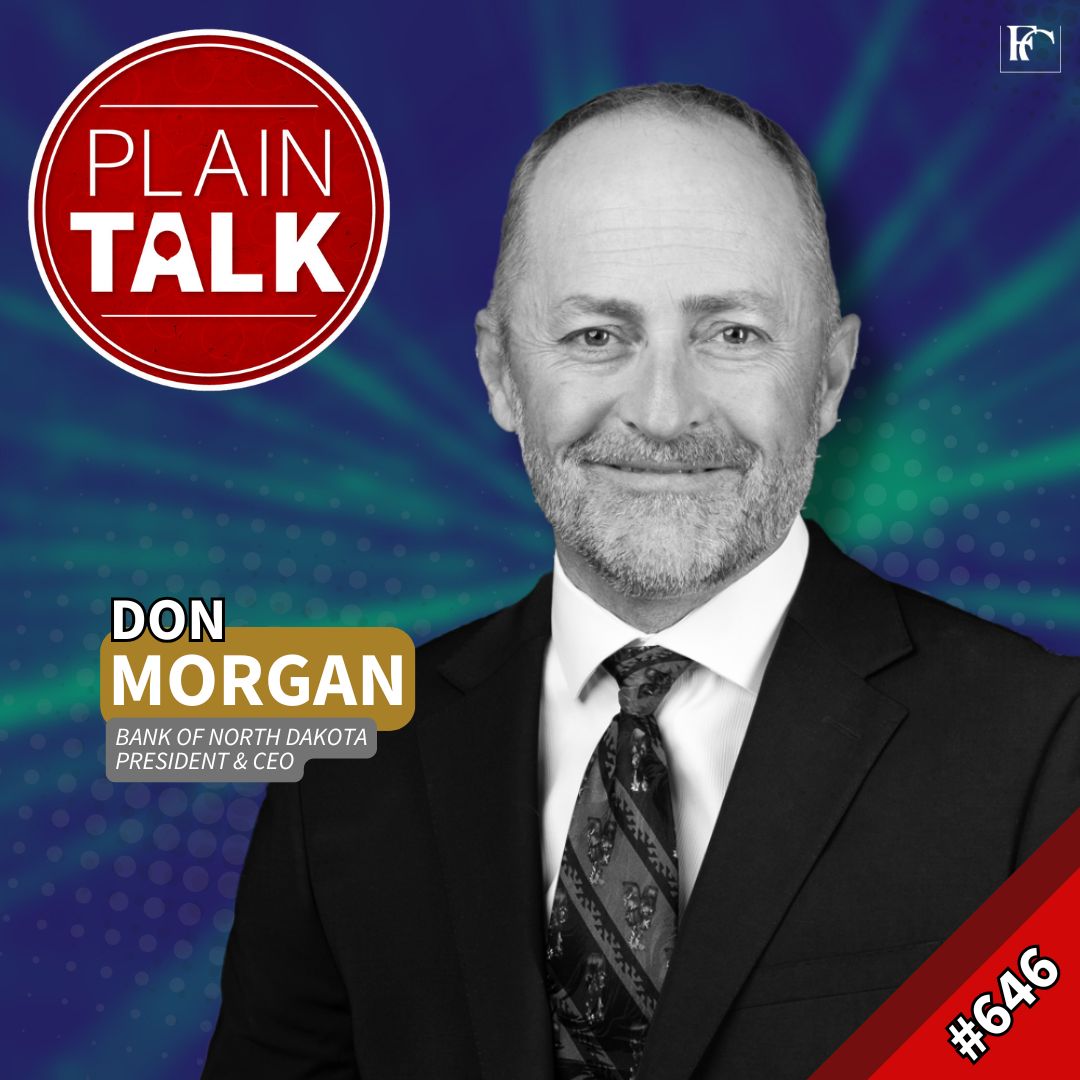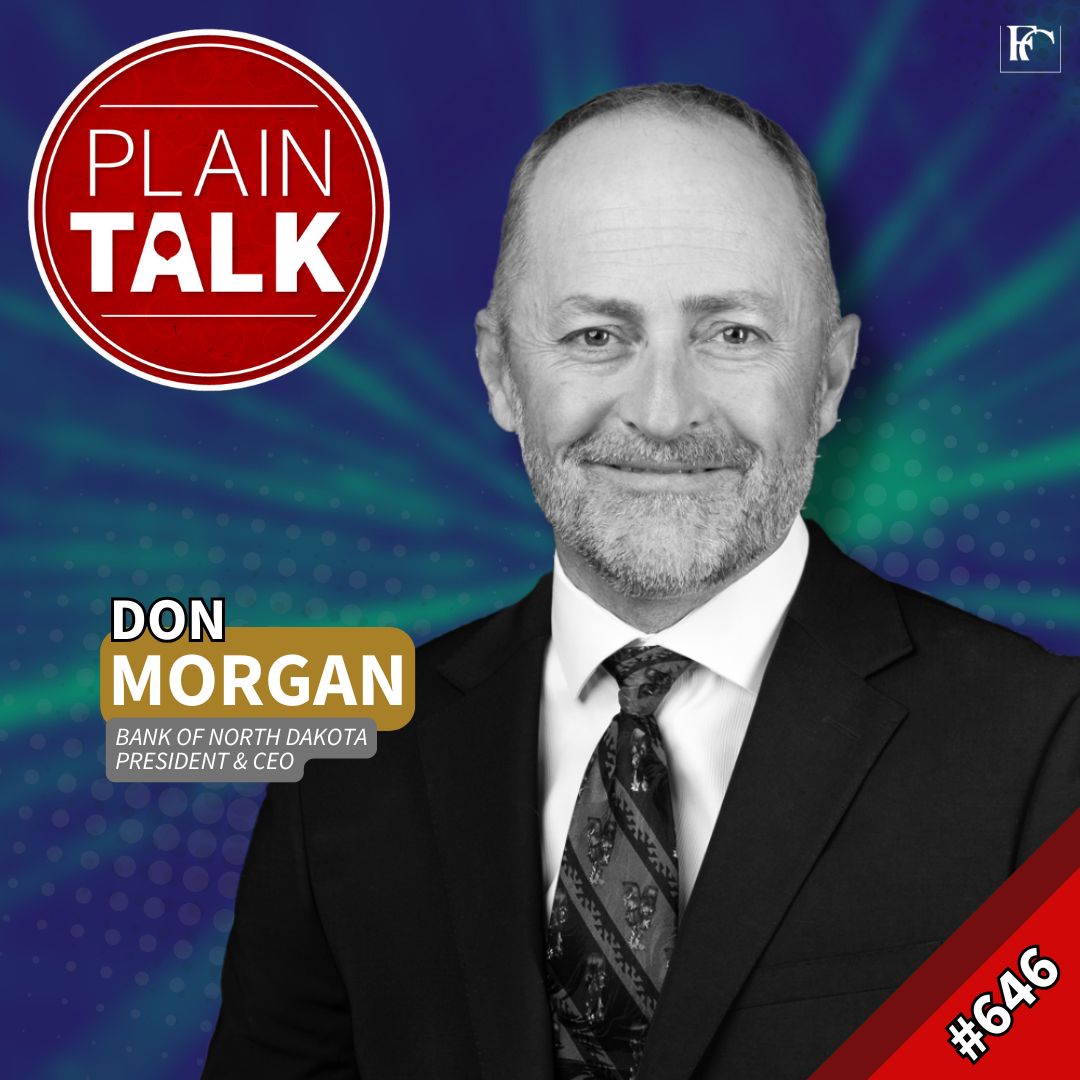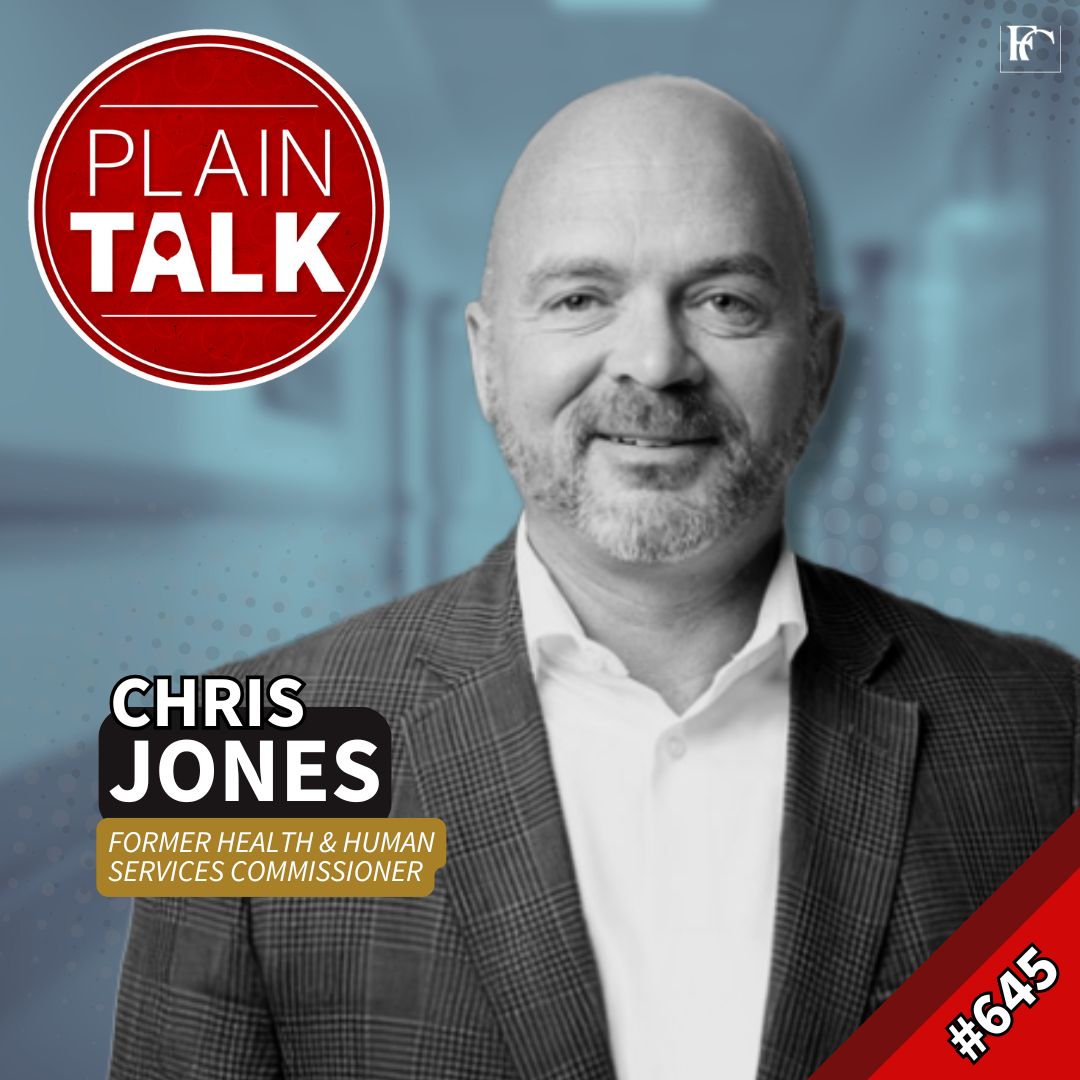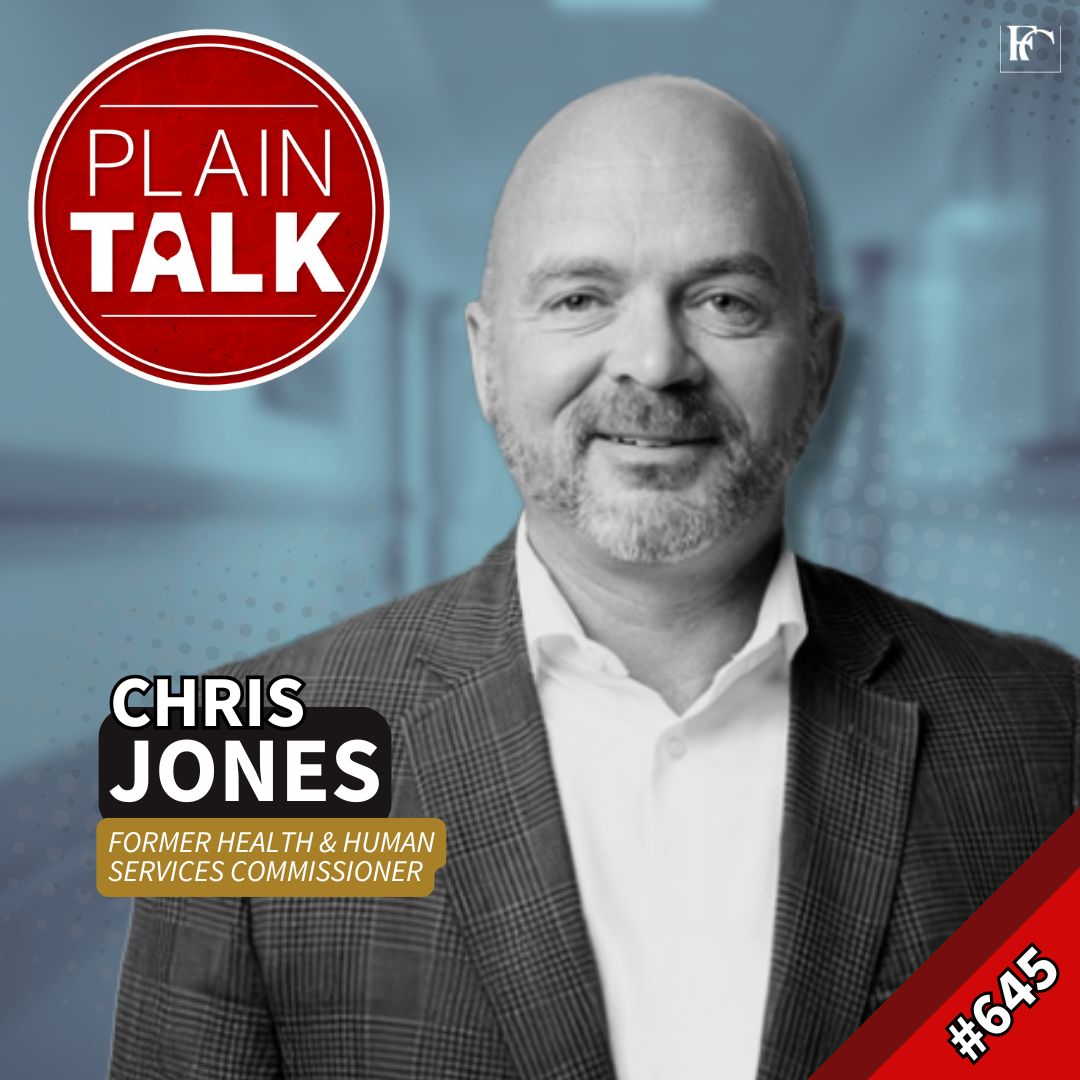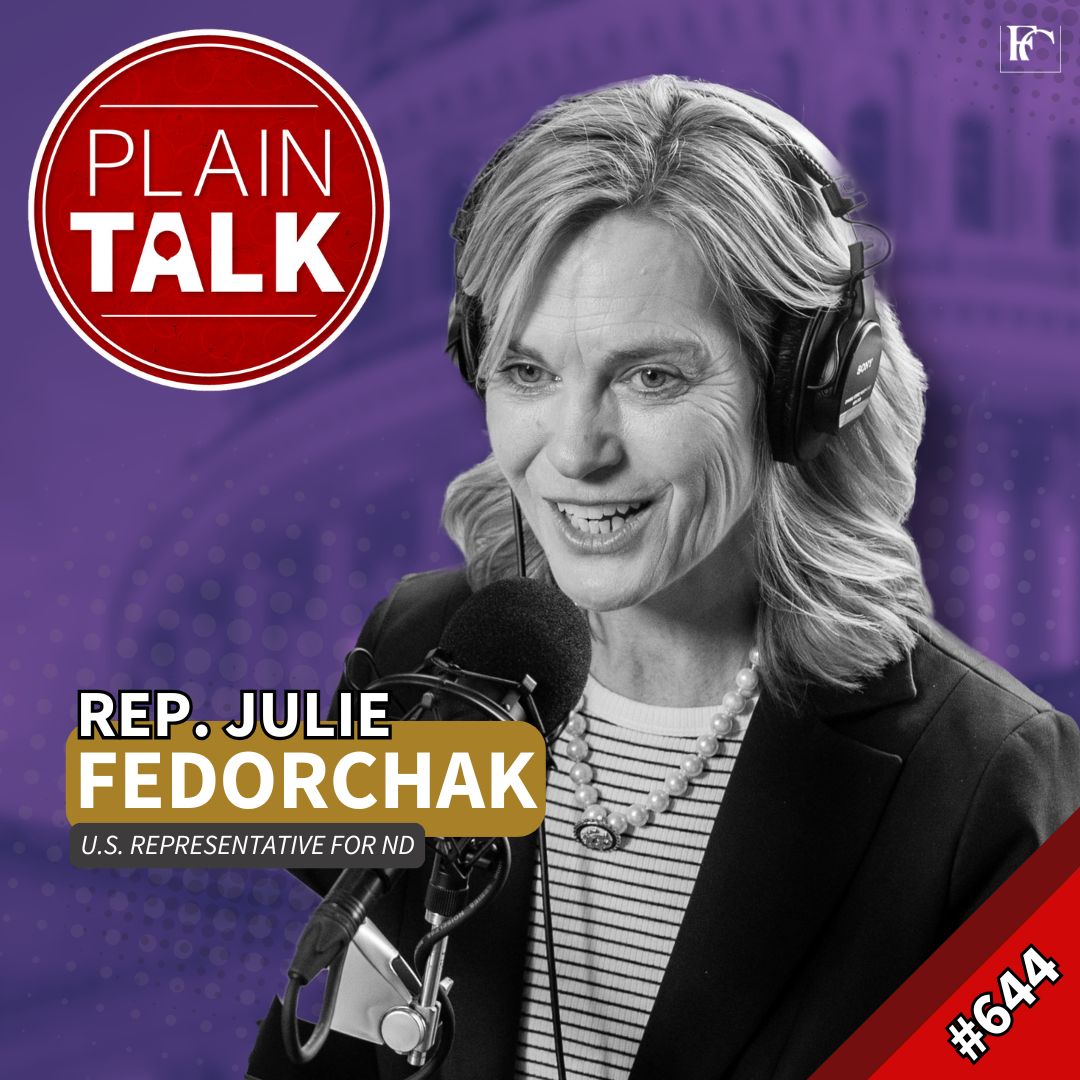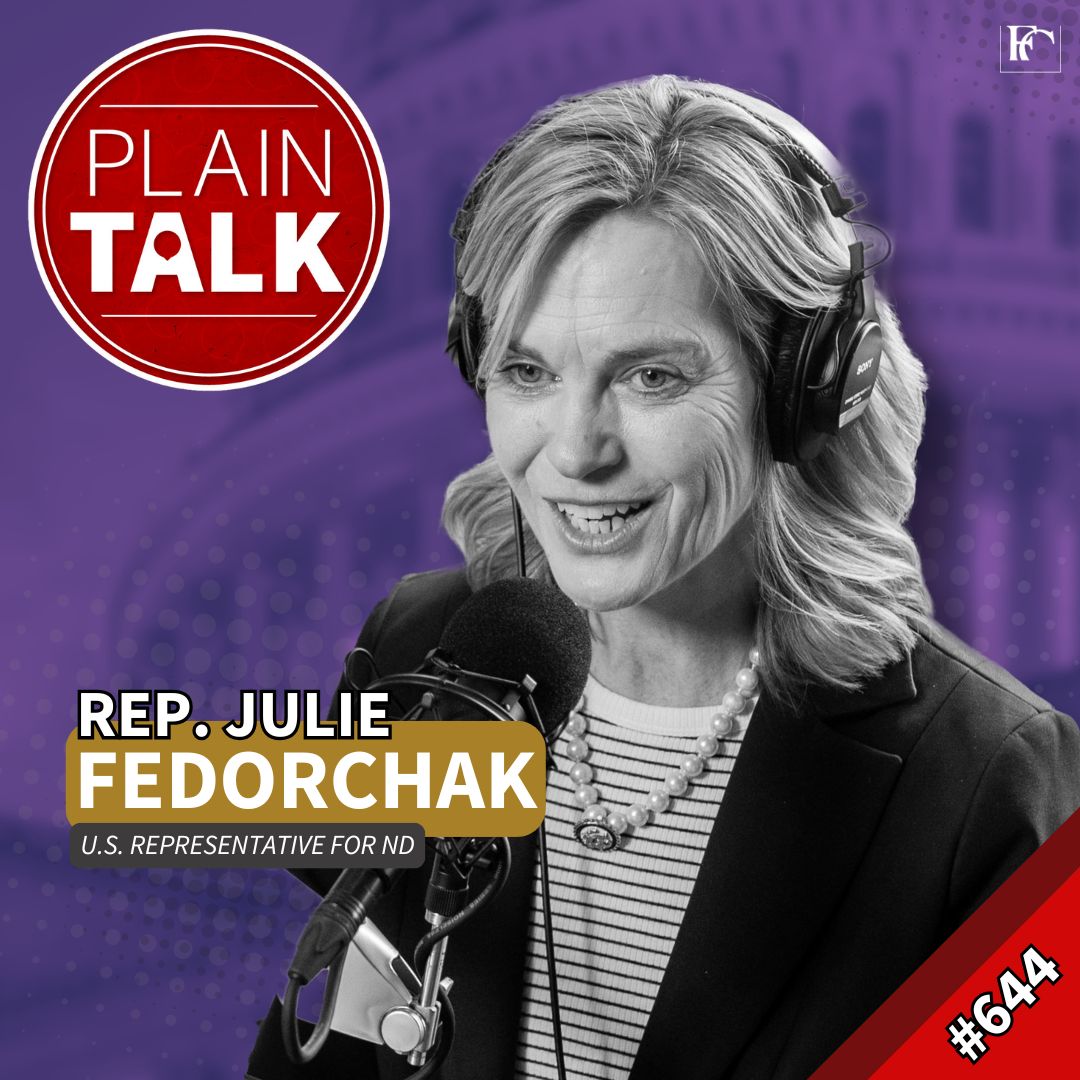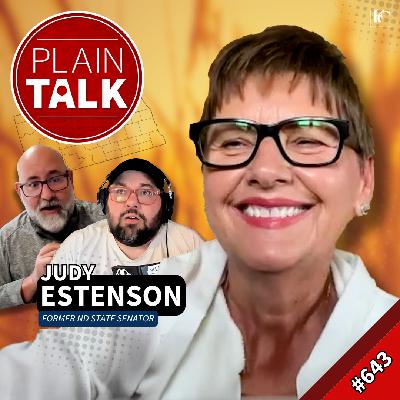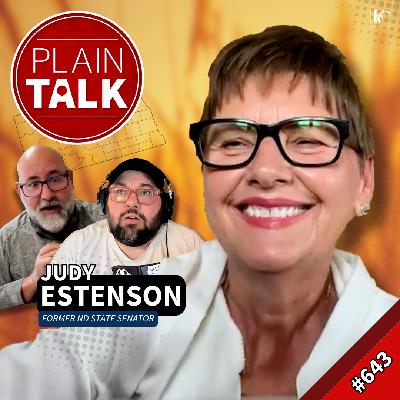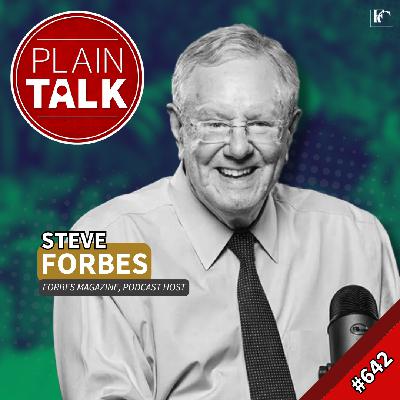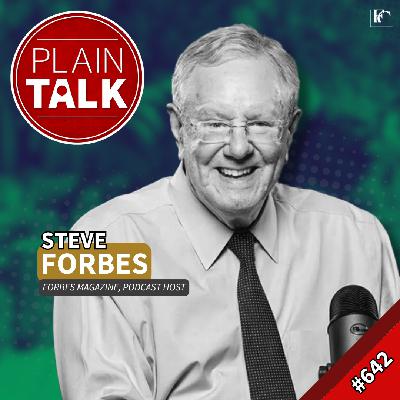Discover Plain Talk
Plain Talk

Plain Talk
Author: Forum Communications Co.
Subscribed: 44Played: 8,090Subscribe
Share
©2025 Forum Communications Co.
Description
Plain Talk is a podcast hosted by Rob Port and Chad Oban focusing on political news and current events in North Dakota. Port is a columnist for the Forum News Service published in papers including the Fargo Forum, Grand Forks Herald, Jamestown Sun, and the Dickinson Press. Oban is a long-time political consultant.
776 Episodes
Reverse
"Imagine you're someone a family who is working a job or two or even three, and then all of a sudden, with a week before the end of the month, you learn that the money you had been counting on to purchase food for you and your family isn't going to be there on Saturday, November 1st," Karen Ehrens said on this episode of Plain Talk. "Probably you have rent due or you're a senior on a fixed income scraping by till the end of the month, looking forward to when you might get some help so you can buy groceries. And then you learn a few days before Saturday that that money won't be there." "It's beyond frustrating," she added. It's also unprecedented. "It's a never-before-seen event that's coming," she said. Ehrens is the U.S. Policy Manager for the Alliance to End Hunger, and she's referring to funding for food stamps running out due to the shutdown of the federal government. She is predicting a lot of suffering for vulnerable people. "Nationally, on average, four out of five households that receive SNAP benefits have a child, an elderly person, a person with disabilities," she said. "So, that's who gets SNAP first and foremost." But it doesn't have to be like this, she argued. "They could end this with a decision to release funds that are in an account, and transfer some money over that way, put enough money out around $8 billion to keep SNAP going through the month of November." This interview with Ehrens was recorded before Gov. Kelly Armstrong announced $1.5 million in state assistance to food banks and other programs to help mitigate the blow of halted funding, but she said that while it helps, it's nowhere near enough. "For every meal that's provided through the food bank network across the US, there are eight meals provided by SNAP. So, it's a big gap to fill." If you want to participate in Plain Talk, just give us a call or text at 701-587-3141. It's super easy — leave your message, tell us your name and where you're from, and we might feature it on an upcoming episode. To subscribe to Plain Talk, search for the show wherever you get your podcasts or use one of the links below. Apple Podcasts | Spotify | YouTube | Pocket Casts | Episode Archive
"Imagine you're someone a family who is working a job or two or even three, and then all of a sudden, with a week before the end of the month, you learn that the money you had been counting on to purchase food for you and your family isn't going to be there on Saturday, November 1st," Karen Ehrens said on this episode of Plain Talk. "Probably you have rent due or you're a senior on a fixed income scraping by till the end of the month, looking forward to when you might get some help so you can buy groceries," she continued. "And then you learn a few days before Saturday that that money won't be there." "It's beyond frustrating," she added. It's also unprecedented. "It's a never-before-seen event that's coming," she said. Ehrens is the U.S. Policy Manager for the Alliance to End Hunger, and she's referring to funding for food stamps running out due to the shutdown of the federal government. She is predicting a lot of suffering for vulnerable people. "Nationally, on average, four out of five households that receive SNAP benefits have a child, an elderly person, a person with disabilities," she said. "So, that's who gets SNAP first and foremost." But it doesn't have to be like this, she argued. "They could end this with a decision to release funds that are in an account, and transfer some money over that way, put enough money out around $8 billion to keep SNAP going through the month of November." This interview with Ehrens was recorded before Gov. Kelly Armstrong announced $1.5 million in state assistance to food banks and other programs to help mitigate the blow of halted funding, but she said that while it helps, it's nowhere near enough. "For every meal that's provided through the food bank network across the US, there are eight meals provided by SNAP. So, it's a big gap to fill." If you want to participate in Plain Talk, just give us a call or text at 701-587-3141. It's super easy — leave your message, tell us your name and where you're from, and we might feature it on an upcoming episode. To subscribe to Plain Talk, search for the show wherever you get your podcasts or use one of the links below. Apple Podcasts | Spotify | YouTube | Pocket Casts | Episode Archive
During their regular session earlier this year, North Dakota lawmakers formed its own version of President Donald Trump's Department of Government Efficiency, or DOGE. It's a task force, as opposed to a department, and state Auditor Josh Gallion, who is participating in the meetings, said they've been calling it TOGE to avoid confusion with the federal efforts. But it's been making good progress, including reviewing a big problem the state has when it comes to implementing policy. Namely, that nobody bothers to define what the success of that policy might look like. "I think what we learned a lot was we don't have performance measures," Gallion said on this episode of Plain Talk. He pointed out that the state often creates things, like economic development programs aimed at creating jobs or drawing workers to the state, without any sort of a mechanism for measuring how many jobs were created, or how many workers were inspired to move here. "Is the money that we're putting into these programs, are they achieving desirable results? You know, if we're going to put a million dollars into a workforce program, is it affecting change? Is it moving the needle? Are we bringing workforce in? And how do we calculate some of that?" he asked. Gallion also addressed controversy over an audit of Stark County. The report from his office concluded that the county government was breaking state law capping general fund carry-over balances at no more than 75% of the previous year's revenues. That report also included a response from the county that said "we agree" with the finding, only the county says that Gallion's office added those words, and they didn't agree to it. "We wanted them to state we agree or disagree," Gallion said. "That should be the beginning of every response." He also claimed that the change was made only after consultation with Stark County, though a quote from the county auditor indicated that she didn't expect her county's comments to be modified. "I wrote our responses to the audit for Stark County and I don't think they should have changed them," Stark County Auditor/Treasurer Karen Richard told the Dickinson Press, "but I do appreciate them clarifying why they changed the language." Also on this episode, co-host Chad Oban and I discuss the standoff between Gov. Kelly Armstrong, Senate Majority Leader David Hogue, and Senate Minority Leader Kathy Hogan over new appointments to the state Ethics Committee. If you want to participate in Plain Talk, just give us a call or text at 701-587-3141. It's super easy — leave your message, tell us your name and where you're from, and we might feature it on an upcoming episode. To subscribe to Plain Talk, search for the show wherever you get your podcasts or use one of the links below. Apple Podcasts | Spotify | YouTube | Pocket Casts | Episode Archive
During their regular session earlier this year, North Dakota lawmakers formed its own version of President Donald Trump's Department of Government Efficiency, or DOGE. It's a task force, as opposed to a department, and state Auditor Josh Gallion, who is participating in the meetings, said they've been calling it TOGE to avoid confusion with the federal efforts. But it's been making good progress, including reviewing a big problem the state has when it comes to implementing policy. Namely, that nobody bothers to define what the success of that policy might look like. "I think what we learned a lot was we don't have performance measures," Gallion said on this episode of Plain Talk. He pointed out that the state often creates things, like economic development programs aimed at creating jobs or drawing workers to the state, without any sort of a mechanism for measuring how many jobs were created, or how many workers were inspired to move here. "Is the money that we're putting into these programs, are they achieving desirable results? You know, if we're going to put a million dollars into a workforce program, is it affecting change? Is it moving the needle? Are we bringing workforce in? And how do we calculate some of that?" he asked. Gallion also addressed controversy over an audit of Stark County. The report from his office concluded that the county government was breaking state law capping general fund carry-over balances at no more than 75% of the previous year's revenues. That report also included a response from the county that said "we agree" with the finding, only the county says that Gallion's office added those words, and they didn't agree to it. "We wanted them to state we agree or disagree," Gallion said. "That should be the beginning of every response." He also claimed that the change was made only after consultation with Stark County, though a quote from the county auditor indicated that she didn't expect her county's comments to be modified. "I wrote our responses to the audit for Stark County and I don't think they should have changed them," Stark County Auditor/Treasurer Karen Richard told the Dickinson Press, "but I do appreciate them clarifying why they changed the language." Also on this episode, co-host Chad Oban and I discuss the standoff between Gov. Kelly Armstrong, Senate Majority Leader David Hogue, and Senate Minority Leader Kathy Hogan over new appointments to the state Ethics Committee. If you want to participate in Plain Talk, just give us a call or text at 701-587-3141. It's super easy — leave your message, tell us your name and where you're from, and we might feature it on an upcoming episode. To subscribe to Plain Talk, search for the show wherever you get your podcasts or use one of the links below. Apple Podcasts | Spotify | YouTube | Pocket Casts | Episode Archive
Farmers and ranchers are in a particularly vulnerable spot amid this protracted shutdown of the federal government. President Donald Trump's erratic trade policies have driven up the cost of doing business, and complicated access to international markets, even as crop prices have come in below profitable levels. Trump's push prop up Argentinian President Javier Milei, an admirer and populist ally, through direct cash bailouts and quadrupling the beef imports from that country have also made life difficult for North Dakota ranchers at a time when farm and ranch bankruptcies are soaring. Also, farmers and ranchers, who typically don't have access to employer-backed health insurance policies, are major users of the insurance marketplace created by Obamacare. Federal subsidies for those plans are the primary bone of contention between Democrats and Republicans during the shutdown. North Dakota Insurance Commissioner Jon Godfread has warned that if Congress doesn't renew those subsidies soon, those who get their insurance from the marketplace will face dramatic premium increases. It is in this environment that the North Dakota Farm Bureau, one of the largest and most importance agriculture advocacy groups in the state, is set to elect a new leader. Val Wagner, one of the candidates for that position, joined this episode of Plain Talk. "I personally just feel like the best way to have people understand where their food comes comes from, and for them to care about where their food comes from, is to talk to them about it, to have a relationship with them, so that they understand this isn't just some name on a box somewhere," she said. "That it really is a family that's behind all of this." She also addressed the complex politics around agriculture issues, particularly at a time when much of the pain farmers and ranchers are facing is being caused a president rural Americans voted for overwhelmingly. Wagner says that she wants to make the group less ideological than it has been in the past. "I really think that's our biggest thing, is that we need to re-engage those members that we have started to not hear from because they feel like sometimes the fringe is getting more attention than they are," she said. If you want to participate in Plain Talk, just give us a call or text at 701-587-3141. It's super easy — leave your message, tell us your name and where you're from, and we might feature it on an upcoming episode. To subscribe to Plain Talk, search for the show wherever you get your podcasts or use one of the links below. Apple Podcasts | Spotify | YouTube | Pocket Casts | Episode Archive
Farmers and ranchers are in a particularly vulnerable spot amid this protracted shutdown of the federal government. President Donald Trump's erratic trade policies have driven up the cost of doing business, and complicated access to international markets, even as crop prices have come in below profitable levels. Trump's push prop up Argentinian President Javier Milei, an admirer and populist ally, through direct cash bailouts and quadrupling the beef imports from that country have also made life difficult for North Dakota ranchers at a time when farm and ranch bankruptcies are soaring. Also, farmers and ranchers, who typically don't have access to employer-backed health insurance policies, are major users of the insurance marketplace created by Obamacare. Federal subsidies for those plans are the primary bone of contention between Democrats and Republicans during the shutdown. North Dakota Insurance Commissioner Jon Godfread has warned that if Congress doesn't renew those subsidies soon, those who get their insurance from the marketplace will face dramatic premium increases. It is in this environment that the North Dakota Farm Bureau, one of the largest and most importance agriculture advocacy groups in the state, is set to elect a new leader. Val Wagner, one of the candidates for that position, joined this episode of Plain Talk. "I personally just feel like the best way to have people understand where their food comes comes from, and for them to care about where their food comes from, is to talk to them about it, to have a relationship with them, so that they understand this isn't just some name on a box somewhere," she said. "That it really is a family that's behind all of this." She also addressed the complex politics around agriculture issues, particularly at a time when much of the pain farmers and ranchers are facing is being caused a president rural Americans voted for overwhelmingly. Wagner says that she wants to make the group less ideological than it has been in the past. "I really think that's our biggest thing, is that we need to re-engage those members that we have started to not hear from because they feel like sometimes the fringe is getting more attention than they are," she said. If you want to participate in Plain Talk, just give us a call or text at 701-587-3141. It's super easy — leave your message, tell us your name and where you're from, and we might feature it on an upcoming episode. To subscribe to Plain Talk, search for the show wherever you get your podcasts or use one of the links below. Apple Podcasts | Spotify | YouTube | Pocket Casts | Episode Archive
This week Gov. Kelly Armstrong announced his appointment to replace Superintendent Kirsten Baesler, who has been confirmed for a position in President Donald Trump's administration, but it's a somewhat unusual situation. Levi Bachmeier can't take office yet, because Baesler can't officially take her position in the federal government, because the government is shut down. But eventually the rancor in Washington D.C. will subside enough for Baesler to move up, and for Bachmeier to move in. In the mean time, the new appointee says he has resigned his seat on the State Board of Higher Education — "I submitted a resignation letter to the governor right after the press conference," he said on this episode of Plain Talk — and will be helping his replacement transition into his job as business manager for West Fargo Public Schools. As for his new job? "I have a responsibility to ensure that that the focus is on what's best for students," he said. The superintendent job is an elected one, and even though the four-year term he's taking over from Baesler just started this year, state law requires Bachmeier to appear on next year's ballot to have his appointment confirmed. The office is officially nonpartisan, but traditionally the candidates for it have sought endorsements from their political parties. The North Dakota Republican Party, which had endorsed Baesler in her three previous campaigns, has been taken over by a populist faction of Republicans and denied Baesler the party's endorsement at last year's state convention. How will Bachmeier, who, like Baesler, is a political moderate, handle that situation? "I'm a Republican. I'm a conservative," Bachmeier, a former district chairman for the NDGOP, told us. "I won't be seeking, you know, the the Democratic convention support." But he's not sure about seeking the NDGOP's endorsement either, saying he needs to "think really hard about what I do as a Republican when it comes to running for a nonpartisan seat." "I've been really focused on just thinking through how do I do the job well, and hope that if that's done well, the the politics will take care of itself," he said. If you want to participate in Plain Talk, just give us a call or text at 701-587-3141. It's super easy — leave your message, tell us your name and where you're from, and we might feature it on an upcoming episode. To subscribe to Plain Talk, search for the show wherever you get your podcasts or use one of the links below. Apple Podcasts | Spotify | YouTube | Pocket Casts | Episode Archive
This week Gov. Kelly Armstrong announced his appointment to replace Superintendent Kirsten Baesler, who has been confirmed for a position in President Donald Trump's administration, but it's a somewhat unusual situation. Levi Bachmeier can't take office yet, because Baesler can't officially take her position in the federal government, because the government is shut down. But eventually the rancor in Washington D.C. will subside enough for Baesler to move up, and for Bachmeier to move in. In the mean time, the new appointee says he has resigned his seat on the State Board of Higher Education — "I submitted a resignation letter to the governor right after the press conference," he said on this episode of Plain Talk — and will be helping his replacement transition into his job as business manager for West Fargo Public Schools. As for his new job? "I have a responsibility to ensure that that the focus is on what's best for students," he said. The superintendent job is an elected one, and even though the four-year term he's taking over from Baesler just started this year, state law requires Bachmeier to appear on next year's ballot to have his appointment confirmed. The office is officially nonpartisan, but traditionally the candidates for it have sought endorsements from their political parties. The North Dakota Republican Party, which had endorsed Baesler in her three previous campaigns, has been taken over by a populist faction of Republicans and denied Baesler the party's endorsement at last year's state convention. How will Bachmeier, who, like Baesler, is a political moderate, handle that situation? "I'm a Republican. I'm a conservative," Bachmeier, a former district chairman for the NDGOP, told us. "I won't be seeking, you know, the the Democratic convention support." But he's not sure about seeking the NDGOP's endorsement either, saying he needs to "think really hard about what I do as a Republican when it comes to running for a nonpartisan seat." "I've been really focused on just thinking through how do I do the job well, and hope that if that's done well, the the politics will take care of itself," he said. If you want to participate in Plain Talk, just give us a call or text at 701-587-3141. It's super easy — leave your message, tell us your name and where you're from, and we might feature it on an upcoming episode. To subscribe to Plain Talk, search for the show wherever you get your podcasts or use one of the links below. Apple Podcasts | Spotify | YouTube | Pocket Casts | Episode Archive
On previous episodes of Plain Talk, North Dakota Insurance Commisisoner Jon Godfread and Chris Jones, the former head of the state Department of Health and Human Services who is just wrapping up a stint as an adviser in President Donald Trump's administration, argued that health care pricing is opaque. They said that lack of transparency contributes to spiraling health care costs, and thus the rising cost of health insurance. Godfread, specifically, pointed to research his office has done in North Dakota -- he's called it a "secret shopper" study -- showing wide disparities in pricing for routine procedures between the state's hospitals. In some cases, the price difference is as much as 600%. For his part, Jones said that spiral prices for care, driving spiral prices for insurance, are bringing us "precipitously close to having a significant issue with access to health care." What do the people who charge those prices have to say about it? Tim Blasl, the president of the North Dakota Hospital Association, said that while care providers do make prices available, that's usually not what those providers actually charge. "Typically we don't collect those charges," he said on this episode of Plain Talk. "I would say 90 to 93% of our payments that we receive, whether it's from the federal government and CMS, or state Medicaid, or commercial, those have been sort of predetermined already. So even though we have a charge, we are not collecting what we charge." "We do have to establish a charge," he continued, "but, again, if you have insurance in this country, you are not paying what that charge is. You're paying that negotiated rate that's been determined between the payer and the provider." As for the secret shoppers? Blasl wondered if some of the differences could be the different ways hospitals calculate prices. A single procedure could require care from different groups within a hospital -- anesthesiology, radiation, etc. -- and when some hospitals provide a quote, they might be including prices for the entire bundle of care that procedure requires or just one part of it. During the legislative session earlier this year, Rep. Jared Hendrix, a Republican from Fargo, introduced House Bill 1594, which would have implemented new state-level requirements for price transparency from hospitals. Why did Blasl's organization oppose it? Because it was duplicative. "The state wanted to make it a requirement, you know back in the last session, and we felt that was just another layer, because it mirrored what the federal government was doing," Blasl said. "If you look at what that bill required hospitals to do, it's the same thing as what CMS requires us to do today," he continued. "We just felt like it's a federal requirement now, why should we be spending state dollars to monitor it on the state level when the feds do it already?" he added. If you want to participate in Plain Talk, just give us a call or text at 701-587-3141. It's super easy — leave your message, tell us your name and where you're from, and we might feature it on an upcoming episode. To subscribe to Plain Talk, search for the show wherever you get your podcasts or use one of the links below. Apple Podcasts | Spotify | YouTube | Pocket Casts | Episode Archive
On previous episodes of Plain Talk, North Dakota Insurance Commisisoner Jon Godfread and Chris Jones, the former head of the state Department of Health and Human Services who is just wrapping up a stint as an adviser in President Donald Trump's administration, argued that health care pricing is opaque. They said that lack of transparency contributes to spiraling health care costs, and thus the rising cost of health insurance. Godfread, specifically, pointed to research his office has done in North Dakota -- he's called it a "secret shopper" study -- showing wide disparities in pricing for routine procedures between the state's hospitals. In some cases, the price difference is as much as 600%. For his part, Jones said that spiral prices for care, driving spiral prices for insurance, are bringing us "precipitously close to having a significant issue with access to health care." What do the people who charge those prices have to say about it? Tim Blasl, the president of the North Dakota Hospital Association, said that while care providers do make prices available, that's usually not what those providers actually charge. "Typically we don't collect those charges," he said on this episode of Plain Talk. "I would say 90 to 93% of our payments that we receive, whether it's from the federal government and CMS, or state Medicaid, or commercial, those have been sort of predetermined already. So even though we have a charge, we are not collecting what we charge." "We do have to establish a charge," he continued, "but, again, if you have insurance in this country, you are not paying what that charge is. You're paying that negotiated rate that's been determined between the payer and the provider." As for the secret shoppers? Blasl wondered if some of the differences could be the different ways hospitals calculate prices. A single procedure could require care from different groups within a hospital -- anesthesiology, radiation, etc. -- and when some hospitals provide a quote, they might be including prices for the entire bundle of care that procedure requires or just one part of it. During the legislative session earlier this year, Rep. Jared Hendrix, a Republican from Fargo, introduced House Bill 1594, which would have implemented new state-level requirements for price transparency from hospitals. Why did Blasl's organization oppose it? Because it was duplicative. "The state wanted to make it a requirement, you know back in the last session, and we felt that was just another layer, because it mirrored what the federal government was doing," Blasl said. "If you look at what that bill required hospitals to do, it's the same thing as what CMS requires us to do today," he continued. "We just felt like it's a federal requirement now, why should we be spending state dollars to monitor it on the state level when the feds do it already?" he added. If you want to participate in Plain Talk, just give us a call or text at 701-587-3141. It's super easy — leave your message, tell us your name and where you're from, and we might feature it on an upcoming episode. To subscribe to Plain Talk, search for the show wherever you get your podcasts or use one of the links below. Apple Podcasts | Spotify | YouTube | Pocket Casts | Episode Archive
"Banking has been on payment rails that are old and traditional," Don Morgan said on this episode of Plain Talk. "They were built in 1970. They're antiquated." Morgan is the president of the Bank of North Dakota, which recently announced a new blockchain currency called the Roughrider Coin — a "stablecoin," in the parlance of the industry. He came on the show to talk about how that will serve the interests of North Dakotans. The answer? It won't. Not directly. At least not at first. As Morgan's analogy about "rails" makes clear, the best way to think about this new currency is as infrastructure. This is a "blockchain-enabled transaction framework," Morgan said. Right now, when you make an online payment, or you swipe your debit card at the grocery story, your transaction is processed through a lot of computers that ensure that you're nor using a stolen car, or that you have enough available credit or account balance to cover the transaction. But this process can be slow, and expensive both for the businesses accepting the payments and their customers making them. Banks in our region will have the Roughrider Coin available to innovate when it comes to those sort of transactions. They'll be able to "begin to build a blockchain enabled digital transaction framework for banking," which would be the "first of its kind." The potential applications are numerous. Another example Morgan referenced was using the Roughrider coin as an on and off ramp for international currencies. North Dakota agriculture businesses frequently operate in various international markets, and navigating the various foreign currencies can be difficult. This coin could make it easier. Morgan also talked about North Dakota's new program aimed at helping furloughed federal workers and military workers through the government shutdown. The idea was implemented by the state Industrial Commission, which oversees the Bank of North Dakota, and it will facilitate 2% loans to furloughed workers for up to 90 days worth of their pay. "These are North Dakota residents living next to you," Morgan said, arguing that it's right for the state to step in and help smooth out any disruptions to their lives. If you want to participate in Plain Talk, just give us a call or text at 701-587-3141. It's super easy — leave your message, tell us your name and where you're from, and we might feature it on an upcoming episode. To subscribe to Plain Talk, search for the show wherever you get your podcasts or use one of the links below. Apple Podcasts | Spotify | YouTube | Pocket Casts | Episode Archive
"Banking has been on payment rails that are old and traditional," Don Morgan said on this episode of Plain Talk. "They were built in 1970. They're antiquated." Morgan is the president of the Bank of North Dakota, which recently announced a new blockchain currency called the Roughrider Coin — a "stablecoin," in the parlance of the industry. He came on the show to talk about how that will serve the interests of North Dakotans. The answer? It won't. Not directly. At least not at first. As Morgan's analogy about "rails" makes clear, the best way to think about this new currency is as infrastructure. This is a "blockchain-enabled transaction framework," Morgan said. Right now, when you make an online payment, or you swipe your debit card at the grocery story, your transaction is processed through a lot of computers that ensure that you're nor using a stolen car, or that you have enough available credit or account balance to cover the transaction. But this process can be slow, and expensive both for the businesses accepting the payments and their customers making them. Banks in our region will have the Roughrider Coin available to innovate when it comes to those sort of transactions. They'll be able to "begin to build a blockchain enabled digital transaction framework for banking," which would be the "first of its kind." The potential applications are numerous. Another example Morgan referenced was using the Roughrider coin as an on and off ramp for international currencies. North Dakota agriculture businesses frequently operate in various international markets, and navigating the various foreign currencies can be difficult. This coin could make it easier. Morgan also talked about North Dakota's new program aimed at helping furloughed federal workers and military workers through the government shutdown. The idea was implemented by the state Industrial Commission, which oversees the Bank of North Dakota, and it will facilitate 2% loans to furloughed workers for up to 90 days worth of their pay. "These are North Dakota residents living next to you," Morgan said, arguing that it's right for the state to step in and help smooth out any disruptions to their lives. If you want to participate in Plain Talk, just give us a call or text at 701-587-3141. It's super easy — leave your message, tell us your name and where you're from, and we might feature it on an upcoming episode. To subscribe to Plain Talk, search for the show wherever you get your podcasts or use one of the links below. Apple Podcasts | Spotify | YouTube | Pocket Casts | Episode Archive
"We've just made it so complex that the average consumer will never understand it." That's what Chris Jones said on this episode of Plain Talk, referring to the way Americans access and pay for health care. Jones is the former head of the North Dakota Department of Health and Human Services, having served in that role under Gov. Doug Burgum, and he's just finishing up a stint in President Donald Trump's administration where he's advised Secretary of Health Robert F. Kennedy and Centers for Medicare & Medicaid Services administrator Mehmet Oz. He argues that the maze of employer-provided benefits, government programs, premium subsidies, insurance companies, health care companies, and pharmacy companies that Americans must navigate when they're sick or injured just isn't working. "The system is broken," he says, and argues that the root problem for all of this is the cost of care. "It's the price, not the financing mechanisms." What can be done to bring down prices? Transparency is one thing. Americans often have no idea what their care will cost them until they get a bill in the mail, and thanks to the fact that most Americans see their coverage by a third party (an employer-provided insurance policy, or a government program) they have little incentive to find out. Jones also weighed in on the tug of war between Republicans and Democrats over health care during the ongoing government shutdown. He said that claims from Democrats that "nursing homes are going to close, benefits are being cut for kids and individuals with disabilities" culdn't be "further from the truth." He also supported new work requirements for Medicaid recipients scheduled to begin in 2029. These rules require enrollees between 19 and 64 to work, volunteer, or participate in a qualifying activity for at least 80 hours per month. Jones pointed out that we already have work requirements in place for programs like food stamps and welfare. "What I can't understand, morally, is why we think it's okay to work 20 hours a week for food and basic assistance that you need every single day, but to have you work the same amount of time for something you may never use, and that being cruel and unusual, I just can't reconcile in my brain," he said. Also on this episode, co-host Chad Oban and I discussed Superintendent Kirsten Baesler's appointment to a position in the Trump administration and Gov. Kelly Armstrong's announced bridge loan program for furloughed workers. If you want to participate in Plain Talk, just give us a call or text at 701-587-3141. It's super easy — leave your message, tell us your name and where you're from, and we might feature it on an upcoming episode. To subscribe to Plain Talk, search for the show wherever you get your podcasts or use one of the links below. Apple Podcasts | Spotify | YouTube | Pocket Casts | Episode Archive
"We've just made it so complex that the average consumer will never understand it." That's what Chris Jones said on this episode of Plain Talk, referring to the way Americans access and pay for health care. Jones is the former head of the North Dakota Department of Health and Human Services, having served in that role under Gov. Doug Burgum, and he's just finishing up a stint in President Donald Trump's administration where he's advised Secretary of Health Robert F. Kennedy and Centers for Medicare & Medicaid Services administrator Mehmet Oz. He argues that the maze of employer-provided benefits, government programs, premium subsidies, insurance companies, health care companies, and pharmacy companies that Americans must navigate when they're sick or injured just isn't working. "The system is broken," he says, and argues that the root problem for all of this is the cost of care. "It's the price, not the financing mechanisms." What can be done to bring down prices? Transparency is one thing. Americans often have no idea what their care will cost them until they get a bill in the mail, and thanks to the fact that most Americans see their coverage by a third party (an employer-provided insurance policy, or a government program) they have little incentive to find out. Jones also weighed in on the tug of war between Republicans and Democrats over health care during the ongoing government shutdown. He said that claims from Democrats that "nursing homes are going to close, benefits are being cut for kids and individuals with disabilities" culdn't be "further from the truth." He also supported new work requirements for Medicaid recipients scheduled to begin in 2029. These rules require enrollees between 19 and 64 to work, volunteer, or participate in a qualifying activity for at least 80 hours per month. Jones pointed out that we already have work requirements in place for programs like food stamps and welfare. "What I can't understand, morally, is why we think it's okay to work 20 hours a week for food and basic assistance that you need every single day, but to have you work the same amount of time for something you may never use, and that being cruel and unusual, I just can't reconcile in my brain," he said. Also on this episode, co-host Chad Oban and I discussed Superintendent Kirsten Baesler's appointment to a position in the Trump administration and Gov. Kelly Armstrong's announced bridge loan program for furloughed workers. If you want to participate in Plain Talk, just give us a call or text at 701-587-3141. It's super easy — leave your message, tell us your name and where you're from, and we might feature it on an upcoming episode. To subscribe to Plain Talk, search for the show wherever you get your podcasts or use one of the links below. Apple Podcasts | Spotify | YouTube | Pocket Casts | Episode Archive
President Donald Trump's deployment of the military domestically over the objections of local leaders has become a flashpoint in our national debate. The Trump has justified these deployments by citing lawlessness in places like Portland and Chicago, but at least one federal judge has found these claims to be "untethered in reality." North Dakota Rep. Julie Fedorchak has said in the past that a line Trump cannot cross is ignoring the courts, yet with these deployments, Trump is now ignoring court orders. How does she feel about that? She's maintaining her position -- "I think he needs to follow the courts like I've said before," she said on this episode of Plain Talk -- but she also told guest co-host Zach Raknerud and I that she hasn't been following the situation closely. "My conversations with the administration would be you've got to follow the courts, appeal it, and go through that process. That's how the system's designed," she said. Asked about Insurance Commissioner Jon Godfread's assertion that cutting subsidies for health insurance premiums would create a "death spiral" for the insurance industry, Fedorchak said that's a problem that needs to be addressed, but not in the context of the government shutdown. "We want to address it. We want to address it, you know, as soon as we can, but you don't need to tie it to a continuing resolution to keep the government open," she said. She also accused Democrats of making federal health coverage for illegal immigrants a factor in the shutdown. "Democrat states like California and New York were using to provide funding, federal funding to cover illegal immigrants on Medicaid," she said. "They were using federal dollars to cover their state match for legal aliens. We closed that loophole in the Working Families Tax Cuts Act and now by repealing this, they open up that loophole again. And they do indeed allow for coverage on Medicaid for illegal immigrants." On trade issues, Fedorchak said she's sent a letter to President Donald Trump asking for "some sort of a market facilitation a grant program" to help impacted farmers make it through "this fall," but she was also supportive of Trump's trade policies, accusing China of "weaponizing agriculture." Raknerud asked Fedorchak about some of the rhetoric coming from Republicans, casting Democrats as extremists and even "demonic." The Congresswoman said she's not supportive of speaking that way. "I believe in leading by example and that's what I'm doing," she said." I am one that tries to use measured language. I treat people with respect. I have zero tolerance for any sort of political violence or violence as a whole in any issue." Also on this episode, Zach and I discuss Trump's domestic troop deployments, the national debt, and the ongoing controversy around Rep. Dustin McNally's appointment in District 42. If you want to participate in Plain Talk, just give us a call or text at 701-587-3141. It's super easy — leave your message, tell us your name and where you're from, and we might feature it on an upcoming episode. To subscribe to Plain Talk, search for the show wherever you get your podcasts or use one of the links below. Apple Podcasts | Spotify | YouTube | Pocket Casts | Episode Archive
President Donald Trump's deployment of the military domestically over the objections of local leaders has become a flashpoint in our national debate. The Trump has justified these deployments by citing lawlessness in places like Portland and Chicago, but at least one federal judge has found these claims to be "untethered in reality." North Dakota Rep. Julie Fedorchak has said in the past that a line Trump cannot cross is ignoring the courts, yet with these deployments, Trump is now ignoring court orders. How does she feel about that? She's maintaining her position -- "I think he needs to follow the courts like I've said before," she said on this episode of Plain Talk -- but she also told guest co-host Zach Raknerud and I that she hasn't been following the situation closely. "My conversations with the administration would be you've got to follow the courts, appeal it, and go through that process. That's how the system's designed," she said. Asked about Insurance Commissioner Jon Godfread's assertion that cutting subsidies for health insurance premiums would create a "death spiral" for the insurance industry, Fedorchak said that's a problem that needs to be addressed, but not in the context of the government shutdown. "We want to address it. We want to address it, you know, as soon as we can, but you don't need to tie it to a continuing resolution to keep the government open," she said. She also accused Democrats of making federal health coverage for illegal immigrants a factor in the shutdown. "Democrat states like California and New York were using to provide funding, federal funding to cover illegal immigrants on Medicaid," she said. "They were using federal dollars to cover their state match for legal aliens. We closed that loophole in the Working Families Tax Cuts Act and now by repealing this, they open up that loophole again. And they do indeed allow for coverage on Medicaid for illegal immigrants." On trade issues, Fedorchak said she's sent a letter to President Donald Trump asking for "some sort of a market facilitation a grant program" to help impacted farmers make it through "this fall," but she was also supportive of Trump's trade policies, accusing China of "weaponizing agriculture." Raknerud asked Fedorchak about some of the rhetoric coming from Republicans, casting Democrats as extremists and even "demonic." The Congresswoman said she's not supportive of speaking that way. "I believe in leading by example and that's what I'm doing," she said." I am one that tries to use measured language. I treat people with respect. I have zero tolerance for any sort of political violence or violence as a whole in any issue." Also on this episode, Zach and I discuss Trump's domestic troop deployments, the national debt, and the ongoing controversy around Rep. Dustin McNally's appointment in District 42. If you want to participate in Plain Talk, just give us a call or text at 701-587-3141. It's super easy — leave your message, tell us your name and where you're from, and we might feature it on an upcoming episode. To subscribe to Plain Talk, search for the show wherever you get your podcasts or use one of the links below. Apple Podcasts | Spotify | YouTube | Pocket Casts | Episode Archive
After a federal judge imposed a new district map on the State of North Dakota, former Sen. Judy Estenson lost her seat in the state legislature. That's unfair, she argued in a recent letter to the editor of the Minot Daily News, and on this episode of Plain Talk. "I am deeply frustrated that a judge's decision could undo the will of the voters who elected me in 2022," Estenson said. "I am angry that a midcycle court order forced me from from office, deprived district 15 of its chosen senator, and reship district 9 in a way that made it nearly impossible for me or any Republican to win." Co-host Chad Oban rebutted that last claim from Estenson, pointing out that a Republican who ran with Estenson almost did win in the last election, even after redistricting, but the former Senator is correct that legal wrangling over North Dakota's district map has created headaches. The legal fight is still ongoing, too, making the map for the upcoming 2026 election something less than certain. Estenson, an outspoken supporter of President Donald Trump wand whose family is involved in ranching, also commented on the impact tariffs are having on production agriculture. As many as "20 to 30% of small farmers could go out of business and not be able to continue," Estenson, a former candidate for Agriculture Commissioner, told us. While she says she supports Trump's efforts to address "unfair trade practices," she's not certain what the future holds. "I don't think anyone really knows what the end result will be of all these tariffs. I certainly don't." Also on this episode, Oban and I discuss the absurd call on newly-appointed Rep. Dustin McNally to resign from his seat in District 42, the potential impact of data centers on power rates, and outlook for the Yankees and the Dodgers in the post season. If you want to participate in Plain Talk, just give us a call or text at 701-587-3141. It's super easy — leave your message, tell us your name and where you're from, and we might feature it on an upcoming episode. To subscribe to Plain Talk, search for the show wherever you get your podcasts or use one of the links below. Apple Podcasts | Spotify | YouTube | Pocket Casts | Episode Archive
After a federal judge imposed a new district map on the State of North Dakota, former Sen. Judy Estenson lost her seat in the state legislature. That's unfair, she argued in a recent letter to the editor of the Minot Daily News, and on this episode of Plain Talk. "I am deeply frustrated that a judge's decision could undo the will of the voters who elected me in 2022," Estenson said. "I am angry that a midcycle court order forced me from from office, deprived district 15 of its chosen senator, and reship district 9 in a way that made it nearly impossible for me or any Republican to win." Co-host Chad Oban rebutted that last claim from Estenson, pointing out that a Republican who ran with Estenson almost did win in the last election, even after redistricting, but the former Senator is correct that legal wrangling over North Dakota's district map has created headaches. The legal fight is still ongoing, too, making the map for the upcoming 2026 election something less than certain. Estenson, an outspoken supporter of President Donald Trump wand whose family is involved in ranching, also commented on the impact tariffs are having on production agriculture. As many as "20 to 30% of small farmers could go out of business and not be able to continue," Estenson, a former candidate for Agriculture Commissioner, told us. While she says she supports Trump's efforts to address "unfair trade practices," she's not certain what the future holds. "I don't think anyone really knows what the end result will be of all these tariffs. I certainly don't." Also on this episode, Oban and I discuss the absurd call on newly-appointed Rep. Dustin McNally to resign from his seat in District 42, the potential impact of data centers on power rates, and outlook for the Yankees and the Dodgers in the post season. If you want to participate in Plain Talk, just give us a call or text at 701-587-3141. It's super easy — leave your message, tell us your name and where you're from, and we might feature it on an upcoming episode. To subscribe to Plain Talk, search for the show wherever you get your podcasts or use one of the links below. Apple Podcasts | Spotify | YouTube | Pocket Casts | Episode Archive
Steve Forbes, the editor-in-chief of Forbes Media, the host of the "What's Ahead" podcast, and a two-time U.S. Presidential candidate is speaking at North Dakota State University later this month as part of the Challey Institute's Menard Family Distinguished Speaker Series. He dropped by Plain Talk ahead of that speech to talk about some of the economic issues pressing on North Dakotans. Specifically, tariffs, which haven't just made selling crops and livestock harder for farmers and ranchers, but has also driven up their costs. "Tariff is another word for tax, and when you impose a tax you are imposing a barrier of sorts between buyer, seller, producer and consumer," Forbes said. He argues that sweeping and uncertain tariffs, that can change wildly day-to-day based on the whims of President Donald Trump, are slowing down the economy. He also thinks they're illegal. "Tariffs, because they're taxes, have to go through Congress, and most of those haven't gone through that kind of process," he said, adding that he hopes the U.S. Supreme Court will strike them down. But even setting aside they're legality, the tariffs aren't something Republicans should be supporting, Forbes said. "Republicans should not be in favor of tax increases," he told us. Forbes also criticized what he described as "weak dollar" currency policies from the Trump administration — "great countries don't trash their money," he said — and called for a "stable, strong dollar" which will lead to lower interest rates and prevent inflation. Forbes will be espeaking at NDSU on October 23 at 5:30pm. Click here for more information on how to attend in-person or virtually. If you want to participate in Plain Talk, just give us a call or text at 701-587-3141. It's super easy — leave your message, tell us your name and where you're from, and we might feature it on an upcoming episode. To subscribe to Plain Talk, search for the show wherever you get your podcasts or use one of the links below. Apple Podcasts | Spotify | YouTube | Pocket Casts | Episode Archive
Steve Forbes, the editor-in-chief of Forbes Media, the host of the "What's Ahead" podcast, and a two-time U.S. Presidential candidate is speaking at North Dakota State University later this month as part of the Challey Institute's Menard Family Distinguished Speaker Series. He dropped by Plain Talk ahead of that speech to talk about some of the economic issues pressing on North Dakotans. Specifically, tariffs, which haven't just made selling crops and livestock harder for farmers and ranchers, but has also driven up their costs. "Tariff is another word for tax, and when you impose a tax you are imposing a barrier of sorts between buyer, seller, producer and consumer," Forbes said. He argues that sweeping and uncertain tariffs, that can change wildly day-to-day based on the whims of President Donald Trump, are slowing down the economy. He also thinks they're illegal. "Tariffs, because they're taxes, have to go through Congress, and most of those haven't gone through that kind of process," he said, adding that he hopes the U.S. Supreme Court will strike them down. But even setting aside they're legality, the tariffs aren't something Republicans should be supporting, Forbes said. "Republicans should not be in favor of tax increases," he told us. Forbes also criticized what he described as "weak dollar" currency policies from the Trump administration — "great countries don't trash their money," he said — and called for a "stable, strong dollar" which will lead to lower interest rates and prevent inflation. Forbes will be espeaking at NDSU on October 23 at 5:30pm. Click here for more information on how to attend in-person or virtually. If you want to participate in Plain Talk, just give us a call or text at 701-587-3141. It's super easy — leave your message, tell us your name and where you're from, and we might feature it on an upcoming episode. To subscribe to Plain Talk, search for the show wherever you get your podcasts or use one of the links below. Apple Podcasts | Spotify | YouTube | Pocket Casts | Episode Archive


